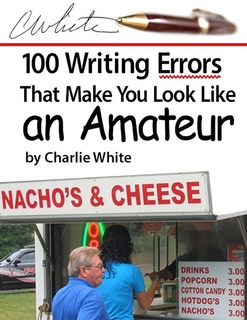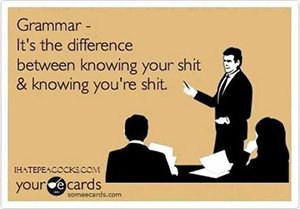
Writing errors make you look bad. I’m here to help. I’ve seen a lot of grammar problems, clichés, awkward usage and just plain awful writing tics in my time, and so I’m on a mission: I’d like to cleanse the Internet of all its amateurish writing.
But I’m scared. Writing about grammar and usage is precarious. What if I get something wrong? What if I use a cliché while slamming cliché usage? I’m on thin ice. What if I start a paragraph with “but?” I’ll take that risk with a boatload of tips that is by no means complete or exhaustive.

Charlie White’s new eBooklet, 100 Writing Errors That Make You Look Like an Amateur, is now on sale! Pick up your copy here or as an iBook on iTunes.
Here’s how I start my impossible mission, pointing out 50 writing errors you must avoid if you’d like to write like a pro:
- Its/it’s: Memorize this, study it, do something, because some readers think this error is so abhorrent, they will stop reading the instant they see you misuse it.
- For free: The word “for” is not necessary. “Get out of jail free.”
- As: I can’t understand how the word “as” has crept into writing like this, but it has: “He can walk long distances, as he is a nomad.” “… then look no further, as we’ve found 10…” Use a dash if you have to, but don’t misuse the word “as.”
- “Out there:” This is almost always unnecessary. It separates writer from reader. Products are not “out there.” Out where? For example, “There are thousands of cellphones out there.” “For all you readers out there…” Draw them in, don’t place them “out there.”
- Over at: “The writers over at Boing Boing found an entertaining video.” Unnecessary words. It’s electronic, they’re not “over at” anything or anywhere. And you only need one directional, not two of them up in here.
- “Reach out:” Strangely enough, this cliché phrase began its touchy-feely life in a television commercial for AT&T. “Reach out and touch someone.” That was the slogan. Now it’s grown into an all-consuming monster. It’s dragged out every time we want to say we contacted someone. I think it’s important to be specific about how you contacted someone. Say emailed, or called, or talked with someone. How did you “reach out?” Was the guy drowning and you reached out to pull him onto the dock? Even if you have to say “contacted someone,” it’s better than “reaching out.” You’re not reaching out to anything, this is all electronic. No reaching.
- Clichés: grails, antes, touch base, loop in, nest egg. The first time someone used these, it was probably clever. Now it’s tired business speak. No grails, don’t raise any more antes.
- Towards: It’s toward. It’s forward. Not towards, not forwards (unless you’re writing in British English).
- The word “that” can often be omitted — e.g. “There’s not much that its code-free apps can’t do.” We use the word “that” in sentences so often, that it’s something that I think that we might want to stop. Stop that. Try dropping the word “that,” and you’ll notice that your sentences are tighter. I mean, you’ll notice your sentences are tighter.
- Company/their: A company is singular. People in a company are “they,” but the company is an “it.”
- “Should” instead of “if” — “Should you find yourself without water or power…” I’m not sure where this one came from, but it’s popping up too often.
- Awesome: This used to be a wonderful word. Now, it’s been overused and it’s lost all its power. I would suggest using it only in its proper context, such as times when you’re referring to explosions, hurricanes, things that are gigantic, unbelievable, one-of-a-kind and rare.
 “Amazing” is elbowing in to take the place of “awesome.” Use it sparingly.
“Amazing” is elbowing in to take the place of “awesome.” Use it sparingly.- Use a semicolon if the second part of your sentence can stand by itself but is still related to the first part: “Basic apps are free; more advanced options start at $39 per month.”
- An ellipsis needs an extra dot (with a total of four) if it’s the end of a sentence…. And be careful with the ellipses overall — they’re on the verge of overuse.
- Impact as a verb: “How has Google impacted your life?” Although some grammar mavens will disagree with me on this one, “Impact” is not a verb unless you’re talking about an asteroid impacting the earth, or a wisdom tooth being impacted. You could have an impact on something, but you can’t impact it.
- Pronoun and antecedent agreement: “Each person must remember their own name.” No. “Each person must remember his own name,” or write around it if you want to be gender-neutral: People must remember their own names. Or if you must, write “his or her.”
- Very: Write very, very, very powerfully and you won’t need to lean on this crutch.
- “We want to hear your thoughts.” I’ve never heard a thought before. I would rather use the word “opinion” for thought, anyway. Or perhaps ask, “let us know what you think.” Thoughts? Don’t ask for them. No one is going to write down thoughts. They’re thinking them, not writing them.
- Premiere vs. premier: I messed this one up on a TV graphic once, and that’s how I learned it. A premiere is an event when something new is presented. Premier is something at the top of its class, the best, or a person who is in charge of a government. Adobe Premiere is a software application. It is the premier video editing application.
- Loose and Lose: You know the difference, right? Oh, what a difference one letter makes. Heads, you win; tails, I lose. I don’t loose.
- No period at the end of a phrase that isn’t a complete sentence and isn’t followed by another sentence (Think: bullet-pointed lists)
- Passed away, passed: “Passed away” softens death and sounds folksy. Funeral directors say it a lot. But it doesn’t sound professional for writers. People die. Deal with it. They are dead. Someone has died. “Passed away” has religious connotations, and it’s amateurish. “Passed” is even worse, sounding like something your great-grandmother would have said. I don’t even like to use the term “RIP,” which also has religious connotations and is archaic, but it’s good for SEO.
- People that, those that — people who, those who. People are referred to as “who,” not “that.” People are humans, not things.
- Throat clearing: When emailing or writing anything, you only have about a dozen words to grab a reader’s attention. Use them wisely. Get to the point in the first paragraph, as quickly as possible. People are busy, and you can’t squander your only chance to lure them in.

 In this line of work, I look up a lot of things. On my way to finding them, I run into a lot of other pieces of info, and simultaneously accumulate some of my own random thoughts and musings. Here I’ve curated 25 of them, in hopes that a few might not have dawned on you. I invite you to add your own in the comments.
In this line of work, I look up a lot of things. On my way to finding them, I run into a lot of other pieces of info, and simultaneously accumulate some of my own random thoughts and musings. Here I’ve curated 25 of them, in hopes that a few might not have dawned on you. I invite you to add your own in the comments.